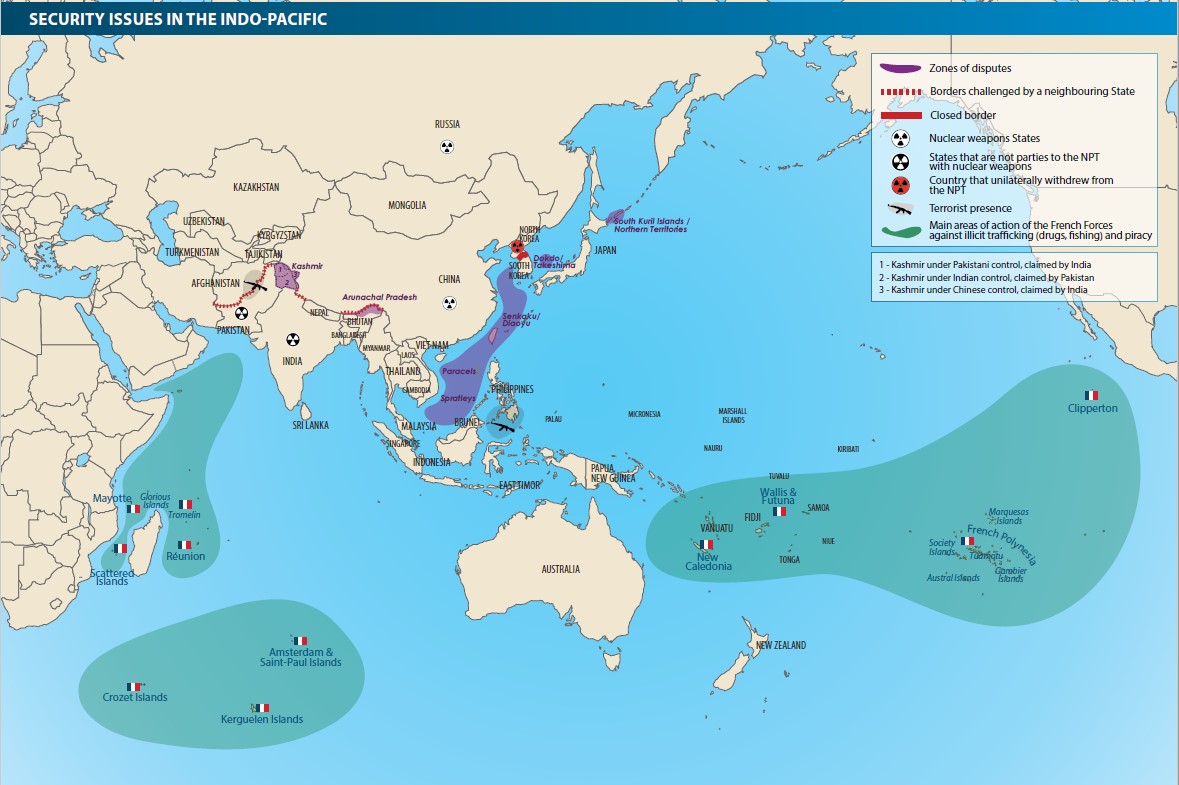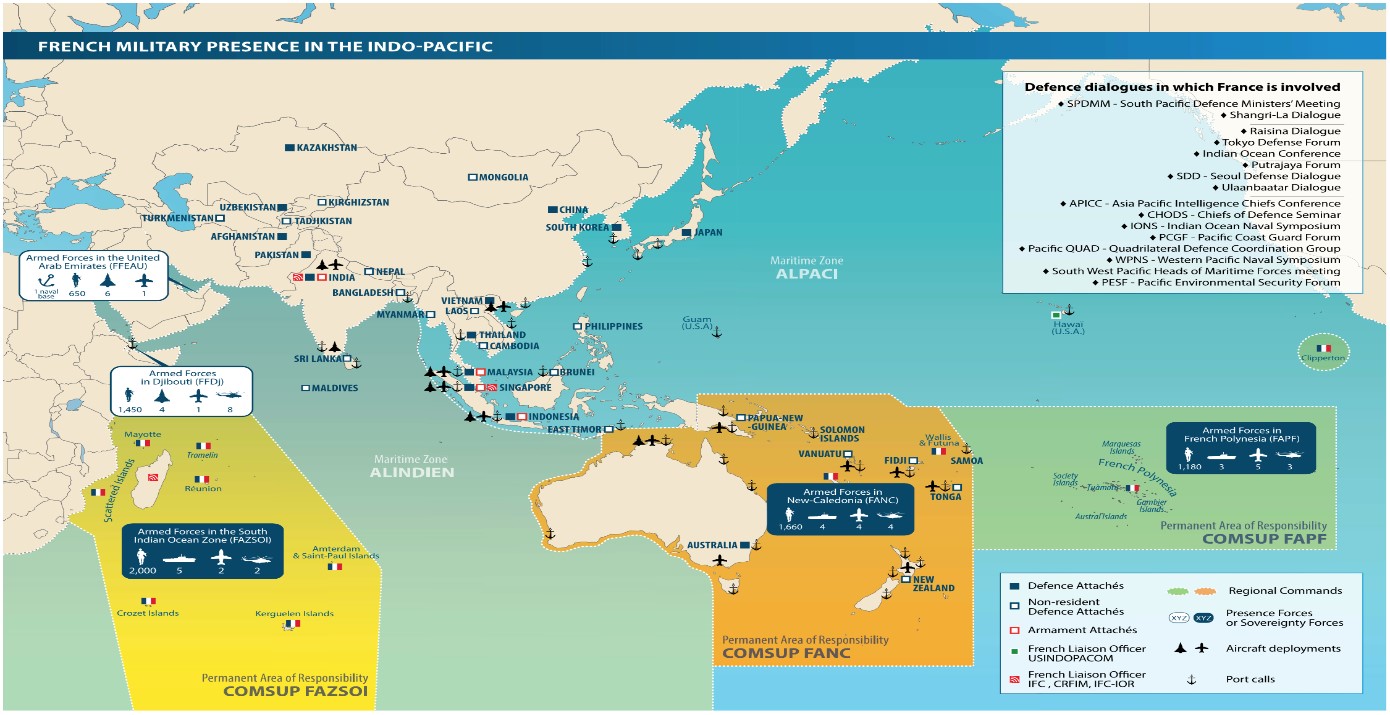The concept of Indo-Pacific discourse has become a frequently used in international relations in recent years. The primary reasons for this can be showed that approximately 60% of the world’s population lives in this geography, approximately one-third of the world’s trade passes through this geography, and significant transit lines are located in this region. Another reason for the Indo-Pacific concept to come to the fore is that the growing great power struggle between the United States of America and China takes place in this area.
This region; considering its economic, political, military and social weight, it is inevitable for many countries to develop strategies on this geography. In recent years, one of the countries whose has increased their attention in the region is France.
France, located in Europe, has a strong sovereign power in the Indo-Pacific region thanks to its islands in the Indo-Pacific region and its Exclusive Economic Zones (EEZ). In the Indo-Pacific region, France has seven overseas territories, which are home to 1.6 million French citizens and account for 9 out of 11 million square kilometres of France’s Exclusive Economic Zone (EEZ). These are: Mayotte, La Reunion, the French Southern and Antarctic territories, New Caledonia, Wallis & Futuna, and French Polynesia.

France also relies on joint regional commands. These are: Commander of the French Armed Forces in the South of the Indian Ocean (COMSUP FAZSOI), Commander of the French Armed Forces in New Caledonia (COMSUP FANC), Commander of the French Armed Forces in French Polynesia and Commander of the Pacific Ocean maritime zone (COMSUP FAPF/ALPACI), Commander of the French Armed Forces in the United Arab Emirates and Commander of the Indian Ocean maritime zone (COMFOR FFEAU/ALINDIEN) and Commander of the French Armed Forces in Djibouti (COMFOR FFDJ). Permanently, 7,000 personnel are stationed throughout the whole area: 4,100 in the Indian Ocean and 2,900 in the Pacific Ocean.

Economic relations between France and the Indo-Pacific region have increased significantly in recent years. More than 1/3 of France’s total exports to non-European Union go to countries of the region. France’s foreign direct investments reached 320 billion euros in 2018. This means that has increase of 75% since 2008[1].
Being aware of the increasing gravity of the Indo-Pacific region, France has reflected the importance of the region in its official reports since the past, but the emphasis has increased in recent years. In The French White Paper on Defence and National Security published in 2008; While it was deduced that the strategic center of the world had shifted to Asia, it was pointed out that France should focuses on beyond West Africa to the entire Indian Ocean and East Asia region.[2] In The French White Paper on Defence and National Security published in 2013; While emphasizing the importance of the Indian Ocean and the importance of sea transportation to Asia for both Europe and France, it was underlined that the Indian Ocean is at the strategic center of gravity of the world.[3]
Since Emmanuel Macron took office as President of France, he has been following the Indo-Pacific region closely. Especially since the USA has started the Free and Open Indo-Pacific strategy (FOIP), France has been trying to adjust its strategy in line with FOIP. In his speech at the military base on Garden Island in Sydney on May 3, 2018, Macron described France as the “Indo-Pacific Power” for the first time and stated the fundamental guidelines of France’s strategy towards the region.[4] In 2019, the French Ministry of Defense published a report titled “France’s Defense Strategy in the Indo-Pacific”[5] and then the French Ministry of Foreign Affairs published a document called “France’s Strategy in the Indo-Pacific”.[6] In April 2021, the French Ministry of Foreign Affairs published the report entitled “France’s Partnerships in the Indo-Pacific”, emphasizing cooperation with countries in the region.[7] In the document published by the Ministry of Defense, the four strategic goals of France in the field of security are listed as follows:[8]
- Defend and ensure the integrity of our sovereignty, the protection of our nationals, territories and EEZ.
- Contribute to the security of regional environments through military and security cooperation.
- Maintain a free and open access to the commons, in cooperation with our partners, in a context of global strategic competition and challenging military environments.
- Assist in maintaining strategic stability and balances through a comprehensive and multilateral action.
France seems to be a country far from its former power in recent years. France is a country, which is in Germany’s shadow in the European Union, decreasing power in Africa in parallel with the increasing power of actors such as Turkey, China and Russia and gradually losing its influence in the Mediterranean. However, the Indo-Pacific region can bring hope to Paris’s “Global France” dreams. But France does not have the capacity to change the game in the Indo-Pacific region. For this reason, France will participate in economic, security and social strategies led by the USA rather than creating its own reality in the Indo-Pacific region. However, while doing this, France will try to add the Indo-Pacific interest that has increased in Europe to his leadership and will try to shape Europe’s Indo-Pacific policies. While the military and territorial presence in the region represents the greatest advantage of France, actors such as China, ASEAN, Russia and India who have increased their power in region where France has neglected for many years, have been limiting the power of France.
While the world is transforming into a multipolar system, power on decision-making process of regional powers has been increasing. The success that France wants to achieve in the Indo-Pacific depends on developing a policy compatible with the new power dynamics. In particular, cooperation with the states in the Mediterranean, Africa and Southeast Asia and the policies aiming to reduce tensions can make a positive contribution to France’s security on the sea line. However, Paris has been taking steps that increase the tension in the Mediterranean, which is a crucial transit route for both France and the Europe Where France wants to pioneer. This means that France is sabotaging own Indo-Pacific policy with its hand. Therefore, contrary to the strategy followed by France in the current situation; It needs to increase its cooperation with Turkey in the Mediterranean.
[1] “French Strategy in The Indo-Pacific “For An Inclusive Indo-Pacific””, Ministry of Europe and Foreign Affairs, s.9.
[2] “The French White Paper on Defence and National Security”, Présidence de la République, (2008), https://media.nti.org/pdfs/15-Fr.pdf, (Erişim Tarihi: 29.06.2021), s.5.
[3] “The French White Paper on Defence and National Security”, Présidence de la République, (2013), https://www.defense.gouv.fr/english/dgris/defence-policy/white-paper-2013/white-paper-2013, (Erişim Tarihi: 29.06.2021), s.56.
[4] “Discours à Garden Island, base navale de Sydney”, Elysee.fr, (2018), https://www.elysee.fr/emmanuel-macron/2018/05/03/discours-a-garden-island-base-navale-de-sydney, (Erişim Tarihi: 29.06.2021).
[5] “France’s Defence Strategy In the Indo-Pacific”, French Ministry of the Armed Forces, (2019), https://www.defense.gouv.fr/content/download/559608/9684004/file/France’s%20Defence%20Strategy%20in%20the%20Indo-Pacific%20-%202019.pdf, (Erişim Tarihi: 29.06.2021)
[6] “French Strategy for The Indo-Pacific: For an Inclusive Indo-Pacific”, French Ministry for Europe and Foreign Affairs, (2019), (Erişim Tarihi: 29.06.2021).
[7] “France’s Partnerships in the Indo-Pacific”, French Ministry for Europe and Foreign Affairs, (2021), https://www.diplomatie.gouv.fr/en/photos-publications-and-graphics/publications/article/france-s-partnerships-in-the-indo-pacific-apr-2021, (Erişim Tarihi: 29.06.2021).
[8] France’s Defence Strategy In the Indo-Pacific. s.8
